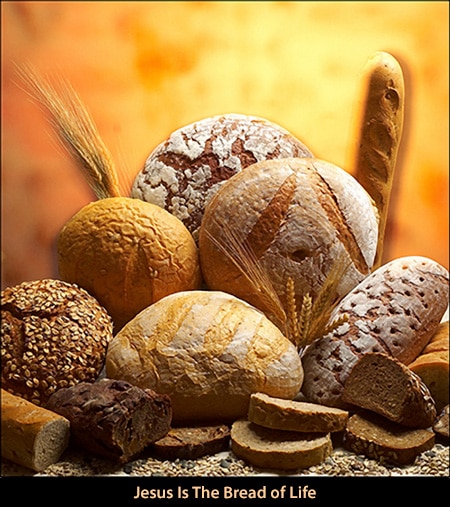John 6:51-58
Chapter 6 of the gospel according to John, is a chapter full of Jew imagery. We find Jesus once again talking about manna, the bread that came down from heaven and he identified himself as the real manna, that real bread. In verse 57 he says: As the living Father sent me, and I live because of the Father; so, he that eat me, he also shall live because of me. Jesus is not just anybread; he is the living bread. He gets his life from the Father who sent him, and he shares the life, the one he received from the father, with anyone who eats his body and blood.
For the Jews who were there with Jesus this sounded strange “How can this man want us to eat his flesh and drink his blood?” For us today this passage sends us immediately to our communion table, bread, his body, wine, his blood, his sacrifice, and Jesus inviting us to eat.
Our sacrament of communion has its origins in the Jew celebration of Passover and both celebrations have something in common, they both bring together past, present and future; they both are celebrated in community, and they also make those who participate a community.
During Passover all Israel’s families get together around the table. On the table they have a lamb, unleavened bread, wine and herbs and they talk, they recalled their story. They remember their past, they talk about when they were slaves in Egypt and how God took them out; they celebrate how God opened the waters, and they walked on dry land; they recall how God took good care of them during their dwelling in the wilderness. They also celebrate the present by thanking God for their freedom, because they are not slaves anymore.
The future is also included in Passover with the fourth and last cup of wine they drink during this meal, the cup of Elijah. This cup is used to anticipate the coming of the Messiah, at this point of the meal they open the door, so Elijah can come in and sit in the extra chair they have around the table.
Passover makes of Israel a community; you see for any country in the world their identity comes from a piece of land. Before 1948 Israel did not have a piece of land to identify themselves as people, it was through the practice of Passover that they kept their identity; Passover made them one body, a community wherever they were.
According to some scholars, this passage we read from John 6 was used as part of the liturgy in the communion service by the early church. Since the beginning of the Christianity, the apostles knew about the similarity between Passover and the Sacrament of communion, between Jesus and the Passover Lamb. When John the Baptist saw Jesus, he said this is the Lamb of God who takes away the sins of the world; Paul in first Corinthians 5:7 says …For Christ, our Passover lamb, has been sacrificed.
When Jesus said: “I am the living bread which came down out of heaven: if any man eats of this bread, he shall live for ever: and the bread which I will give is my flesh, for the life of the world… Very truly, I say unto you, except if you eat the flesh of the Son of man and drink his blood, you have not life in yourselves.” With these words, He is inviting us to sit with him at his table and eat what he has provided for us. As Israel, we find identity and life around the table. Around the communion table we remember our past, celebrate our present and rejoice in our future; around the communion table we receive life and strength; around the communion table we are the living bread community.
How our past, present, and future are present at the communion table celebration? We celebrate our past by remembering what Jesus did for us. What did Jesus do for us? He took our place in the cross; he paid for our sins. The present, we celebrate it by rejoicing in the new creation, the people he made of us; We are people called out of darkness into his wonderful light. Communion also gives us hope for the future. According to Luke 22:17 during the last super Jesus took the cup and said: “Take this and divide it among you. 18For I tell you I will not drink again of the fruit of the vine until the kingdom of God comes.” When we get together around the table and eat the living bread we affirm the coming of our Lord.
When we sit around the table and eat from the bread of life, Jesus dwells in us and we in him and we are one. Remember we are a community not because we come here every Sunday, but because Jesus lives in us. We are a church fed and sustained by Jesus… in other words we are community; we are a very peculiar and unique community.
Today when you come to the table and eat the living bread and drink the real drink let’s remember who we are, we are a community: The “living bread” community.

